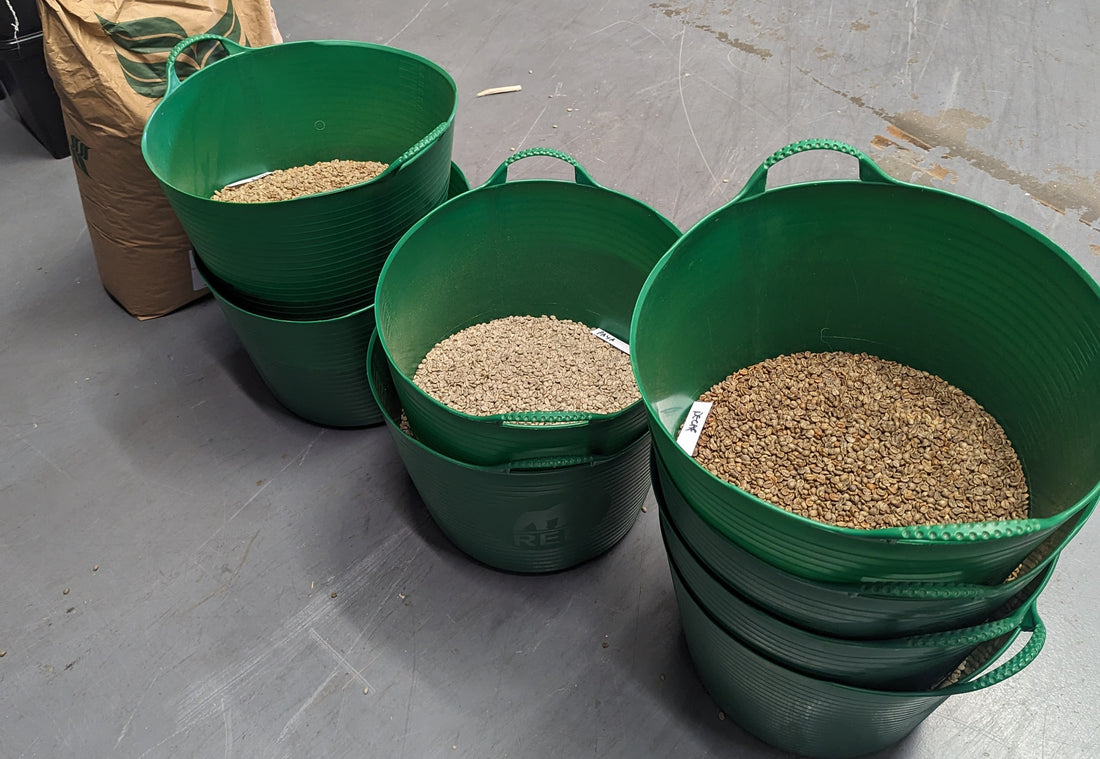THE TRILEMMA OF GREEN BUYING
To start, let me say the quiet part out-loud - the part that’s usually swept under the rug of all the marketing copy and posts -
We buy green coffee. We mostly buy it from importers.
Sourcing coffee isn’t a magic and mystical art - despite all that is done to obfuscate it. We’ve got direct contact with a few of the producers we have purchased from, and we’ll grow that roster in time, but we buy from import partners. There is a huge amount of amazing coffee available, at any time, at the drop of an email. You do not ever have to “go to origin” to “hunt down the most exquisite lots” - this is perhaps one of the biggest changes to have occurred in the boom in speciality coffee over the last 10 years. Much like it is not hard to find amazing roasters out there - there is choice & competition abundant. But not every lot is equal beyond taste -
There is an old saying in engineering - you can have a project cheap, on time, or perfect - pick two.
I would like to repurpose this trilemma for sourcing green coffee:
CHEAP | HIGH QUALITY | ETHICAL
...
Pick two
What do I mean by that?
- If it’s cheap and ethical, it probably isn’t high quality.
- If it’s ethical and high quality - then it ain’t cheap.
- If it’s cheap and high quality - then you’re underpaying someone in the chain the “true” value of what it’s worth, which isn’t ethical, or you’re sacrificing traceability/transparency (and probably still underpaying someone to boot).
This final statement is perhaps the most controversial - the nature of “true” value, and that it isn’t ethical to pay a lower price when the quality is high.
When I talk about “true” value, to be very clear I want to distinguish it from both "fair" value and "economic" value.
The "fair" value suggests a price that has fair compensation to farmers and sustainable production practices - covering the full cost of production plus a profit margin that results in living income, one that accounts for a decent standard of living, and provides minimum price guarantees to shield against market fluctuations.
The "economic" value encompasses the costs of production (including labor and resources), and the dynamics of market demand and consumer willingness to pay. The "economic" value is influenced by factors like brand, quality perception, scarcity and market trends.
But "true" value, as I use it here, refers to the inherent intrinsic quality of the coffee. A value that should, in theory and according to the narratives of speciality coffee, be reflected in its price.
When we consider coffees of similar intrinsic quality (like those scoring 87 points on the SCA coffee scale, which indicates a very high quality), yet observe stark differences in their pricing based on origin, a critical question emerges: Why isn't there a consistent pricing model that aligns with the specialty coffee narrative of paying higher, fair prices for higher quality?
Let us examine a hypothetical example: a washed coffee from Ecuador versus one from Burundi. For the purposes of discussion, let us say that the profile in each lot is indistinguishable. Despite identical quality scores, the stark discrepancy in price that I would expect to see as a green buyer (perhaps double or more for the Ecuador) illustrates a misalignment between the narrative of speciality and the reality.
It suggests that factors beyond intrinsic quality—such as market expectations, production costs (considerably higher in Ecuador than in Burundi, for example), and origin reputation—are significantly influencing pricing. This reality stands in contrast to the industry's professed values of fairness and quality-based compensation. If we can pay that much for coffee from Ecuador - knowing that it is an appropriate cost, then if we say we are putting farmers first and we want maximum impact, then provided we have a transparent value chain that can put that premium to the producers, paying that same rate for a coffee from Burundi would have an inordinately outsized effect.
Of course, if our 87pt coffee from Burundi was £40/kg list price for our wholesale clients, (as might be the case with that Ecuadorian coffee), we face a stark reality. In a market where similar coffees are retailing at £25/kg, our Burundian offering would either struggle to find buyers or require a herculean effort to justify its higher cost. Convincing customers of its additional value, rooted in the impactful support at origin (something that might come with moral reward), becomes a challenging task in a market governed by competitive pricing and established perceptions of value.
We learn through this that the true value in speciality is not just the intrinsic taste quality, but also of novelty, scarcity, and differentiation.
The ethics gap in “true” value, as I see it, is the gap between the highest price you'd willingly pay for a certain coffee quality (from a high water mark of a coffee that considers both its intrinsic worth and the extrinsic factors influencing its marketability and sale price.) - and that of the final price you do eventually pay per lot.
The price we pay for a high quality coffee that comes from a less developed, more disadvantaged part of the world might be lower - and it might well still be "fair", and high impact, even at that lower price.
However, it still means we were willing to exploit the arbitrage of that ethics gap for our own purposes. Taken to its ruthless extreme can mean that while we get cheap, high quality coffee this year, and perhaps the next - eventually the juice isn’t worth the squeeze for the farmer, especially if we actively pay below the cost of production.
Taking the extreme counterpoint, being so principled that you only pay the price of competition grade coffee for every lot you buy - well over the “asking price” - is a pretty swift way to be put yourself out of business, in which case you’re achieving absolutely nothing.
So we all exist inside that gap, along the spectrum of ruthless and altruistic - every decision we make with purchasing and selling coffee exists inside it, sitting somewhere along the line. Every lot has to be weighed up - and a decision has to be made.
CHEAP | HIGH QUALITY | ETHICAL
Pick two.
_____
Stay tuned for the next section - An interlude on Risk, where we'll also look at the ticking clock of freshness


2 comments
Love this – Which two did Scenery choose?
I thought this was a very succinct, honest and accurate description of green buying considerations. Thanks for laying it out. Much respect 🫡